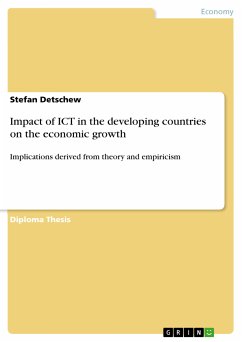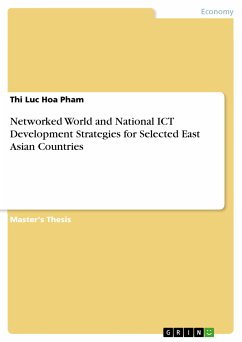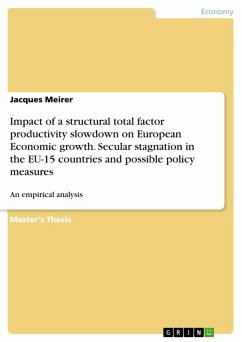Diploma Thesis from the year 2007 in the subject Business economics - Economic Policy, grade: 1,5, Technical University of Ilmenau (Institut für Wirtschaftswissenschaften), language: English, abstract: This paper discusses the relevance of Information and Communication Technologies (ICT) for economic growth in developing economies. By reviewing the contributions from the neoclassical and endogenous growth theory and empiric evidences for the link between ICT and economic growth, the paper clearly concludes that ICTs facilitate economic growth, principally by providing incentives for capital deepening and increasing productivity through rapid technological progress. However, the impact on growth is more extensive from the long-term ICT use and networking that though requires appropriate ICT investment and complementary efforts in order that spillovers and productivity improvements are triggered and exploited totally. This paper derives the key determinants and interacting factors that, in the corresponding correct synergic combination, promote ICT's impact on growth-generating processes. For a variety of reasons, the states of these factors in developing countries provide a less ICT favourable environment for taking advantage from ICTs. These economies exhibit a lower stock of human capacities and per capita capital to trigger the productivity benefits from the ICT use. Therefore, the level of effort is higher than in the developed world to receive return on ICT investment. However, when they achieve to attract capital and knowledge by encouraging ICT investment and technology transfer supported by international openness, maintained financial and institutional systems, deregulation of markets and higher competition, they have the chance to benefit from adopting best practices and technologies from the industrialized world with complementary efforts in the reorganisation of business organisations and processes and enhanced human ICT-skills and management.
Dieser Download kann aus rechtlichen Gründen nur mit Rechnungsadresse in A, B, BG, CY, CZ, D, DK, EW, E, FIN, F, GR, HR, H, IRL, I, LT, L, LR, M, NL, PL, P, R, S, SLO, SK ausgeliefert werden.









